#jordi sierra i fabra
Explore tagged Tumblr posts
Text
youtube
¡Qué disgusto le dio John Mayall al escritor Jordi Sierra i Fabra con un disco como "Notice To Appear"! Es comprensible, fue un disco atípico y de sonido contemporáneo que desconcertó a los fans.
Su asociación con el gran Allen Toussaint en 1976 fue un punto y aparte en la obra del "padrino blanco del blues", y el LP que ambos concibieron - funki, con Toussaint como productor, arreglista y compositor de siete de los diez cortes- Jordi lo llegó a definir como "el peor disco de la carrera de John" en su librito "John Mayall. El Padre Blanco del Blues" (Música de Nuestro Tiempo, 1978), libro que me gusta mucho por otra parte, así como su famosa enciclopedia en 100 fascículos "Historia de la Música Rock", ardua labor difícil de llevar a buen puerto, más en solitario.
Sinceramente, aunque comprendo su desconcierto ante un disco como este, no es un LP malo en absoluto, pero se sale de lo que era y representaba Mayall, una especie de "purismo del blues". Creo que Toussaint pegaba más, por ejemplo, con The Band que con Mayall. Subo mis dos favoritas, "Hail To The Man Who Lives Alone" y "There Will Be a Way".
Esta es para el polémico Jordi, el fan nº 1 de Mayall más abajo de los Pirineos. Un acto de justicia.
youtube
1 note
·
View note
Text
My Favorite Books of 2023
After seeing everyone’s end-of-the-year QL posts and having a look at my meticulous list of books I read this year, I was a little inspired to write up something myself, just not about QLs but books. I’ve been trying to be more vocal about things I like, and post things for myself, and only myself. So I don’t even care how long this is, and just have fun with it.
In terms of literature, this year was pretty slow for me (with only 48 finished books, about half of what it used to be, probably because I’ve been watching so many QLs) and fairly limited to the YA genre because I got stuck with high-school and college stories and haven’t really moved on since. But still I managed to put together the 10 I enjoyed most. Books (like shows) are very subjective to me in that it takes the right one at the right time for me to fall in love with it, so take every one of these with a grain of salt, I guess.
I’m not including any danmei I’m reading because they are so separate from other books to me in what they are and how they work that I can’t be objective with them. Also, I don’t care when any of these books came out, all that matters to me is that I read them for the first time this year.
1. The Inexplicable Logic of my Life by Benjamin Alire Sáenz

This might be my favorite book out of those on this list. I knew I loved Benjamin Alire Sáenz’s poetic and reflective writing after I read Aristotle and Dante Discover the Secrets of the Universe, but this one hit all the right spots for me in a way I can’t compare to any other book I’ve read. It tells the story of a 17-year-old boy named Salvador, his close friends, and his gay father, who go through a million setbacks and tragedies and learn the meaning of life—in its essence, it’s a book about growing up and grieving and living. This author has a way of being painfully real while also wrapping everything in a beautiful language that makes it all even more real and touching. Two of my favorite quotes:
“I wanted to tell (my father) that all the awful things that happened in the old world were dead. And the new world, the world we lived in now, the world we were creating, that world would be better. But I didn’t say it, because I wasn’t sure it was true.”
“I realized that Sam wasn’t angry at all. She was hurt. At that moment I heard all the hurt she’d ever held. And it seemed to me that the whole house had quieted down to listen to her pain.”
2. If You Could See the Sun by Ann Liang

I read this around the beginning of the year, so my memory isn’t the best, but I still love it like I did back then. In the story, Alice, the only scholarship student at a Chinese school for the Rich and Powerful, suddenly starts turning invisible and, due to financial and other pressures on her, decides to turn these new ‘powers’ into profit by obtaining information for classmates and selling it to them. The whole thing starts out pretty innocent, but the requests become more and more severe and dangerous, and Alice essentially has to decide where she draws the line and caves in to all the pressures surrounding her. It’s essentially critical commentary about Chinese society while taking a look at the blurry lines between good and bad, all wrapped in a modern story with fantastical elements.
3. Iron Widow by Xiran Jay Zhao

I finished this book only a few days ago, so I’m still in my feels about it. Even though it’s a little sci-fi and not at all like the books I usually read—what with the army of powerful heroes using giant transforming robots to fight a war against mechatron aliens that eerily remind me of insects—, it absolutely grabbed me with its narration full of incredibly precise and succinct descriptions, balanced out by lines so funny that they had me cackling, and incredible character depth (which, to me, is often the most important thing). Wu Zetian as a main character was compelling to follow, because she is so strong and true to what she wants, rising to power while killing everyone in her path. And the poly storyline brought a lot of joy to my heart, because we get so little of it in YA literature. Plus, it was really nice to read a book examining gender roles without feeling dysphoric even once, which I think was only possible because it was written by a fellow enby person. Some more favorite quotes:
“Where does jealousy come from, if not an insecurity that I’ll lose you because of him? But that’s not how it works, no matter how many people believe it so. You’re not something to be kept or taken, and love isn’t some scarce resource to battle over. Love can be infinite, as much as your heart can be open.”
“Perks of refusing to play by the rules: you don’t have to choose between the boy who’d torture a man to death with you and the boy who’d welcome you back with pastries after.”
“It’s as if I’ve got a cocoon shriveled too tightly around my whole being. If I had my way, I’d exist like that butterfly, giving onlookers no easy way to bind me with a simple label.”
4. Imogen, Obviously by Becky Albertalli
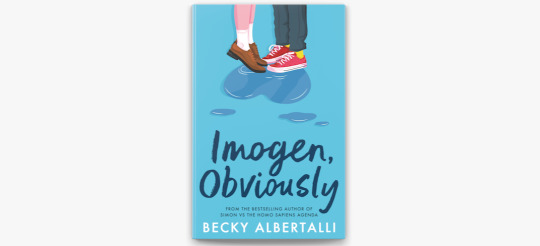
I hit this phase around the middle of the year where I was craving some sapphic romance novels, and this one fell right into my hands. I remember I started this on the 12-hour flight back from China, and it gripped me so hard I finished it in about a day, even though I guess nothing about it is super unique. It’s just a love story about a soon-to-be college student falling for her childhood friend’s new college friend while visiting campus, even though said childhood friend told everyone they are exes. I guess what I really liked about it is the exploration of community, especially queer community, because the protagonist often feels at war between starting to have feelings for a girl and not thinking she fits into what she believes queer people are or should be, causing her to repeatedly deny the possibility of her being queer. Plus, I love deeper thoughts and reflections under the guise of a simple romance plot, and this book is quintessential Becky Albertalli in that regard.
5. El fabuloso mundo de las letras [The Fabulous World of the Letters] by Jordi Sierra i Fabra
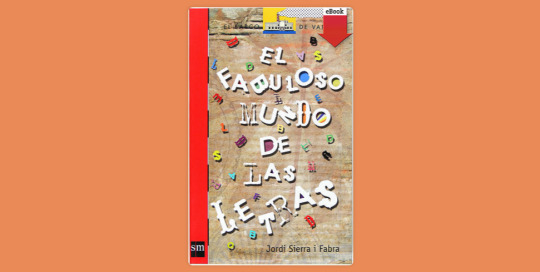
Okay, so this is technically a children’s book written by a well-known Spanish author that was given to me while staying with a friend’s family in Spain, but regardless of the target group, I still absolutely loved it and ate it up. It’s a wonderful look at language and writing and creatively tries to spark enthusiasm for reading in children through fun little games, stories in which letters coming alive and form things like huge forests, crossword puzzles, and more. The frame for it is a story about a boy who hates reading sucked into the world of letters, where he gets to know them and how they work and learns how beautiful language is, which is 100% my thing as a linguist. I will forever grieve all the H’s in the hospital.
6. Tokioregen [Tokyo Rain] by Yasmin Shakarami
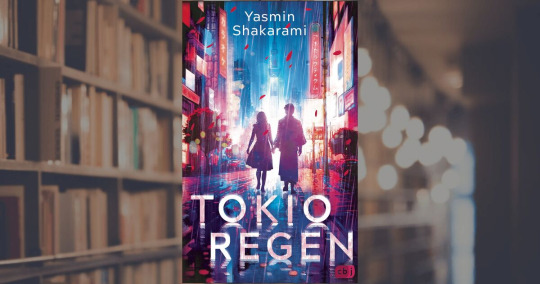
One of the few German books I still read, English has just taken over by now. It’s about a German high school student who spends a semester abroad in Japan, falls in love with the country and a classmate who shows her the hidden parts of Tokyo, and has to witness an earthquake that destroys most of the city. Somehow the author managed to convey Tokyo’s magic in a way I never expected, even though I’ve never been all that interested in Japan, so it sucked me in.
7. When We Were Infinite by Kelly Loy Gilbert
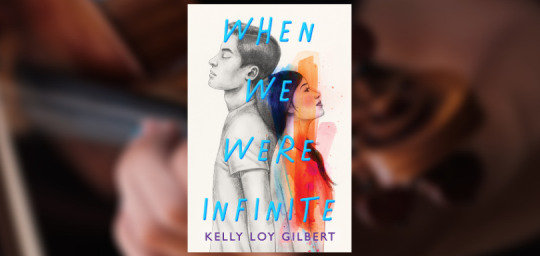
Oof, this one challenged my mental health, but I guess that’s exactly what it was trying to do. We have here a story about a group of close friends who are the most important people to each other, but when they find out one of them, Jason, is abused at home and he tries to kill himself, they all spiral and friendships start to fall apart. It basically takes you along for the ride as the protagonist Beth’s mental health and her friendships go through one of the most terrible experiences of their lives, and that makes you think about a lot of things in your life.
8. I Kissed Shara Wheeler by Casey McQuiston
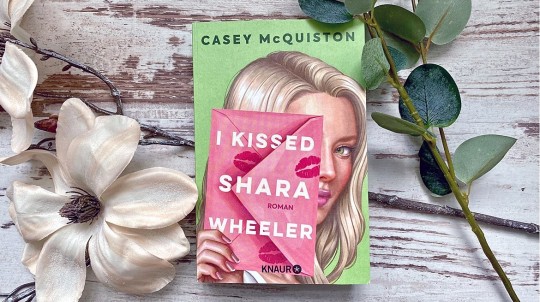
I’ve been a huge fan of Casey McQuiston since Red, White & Royal Blue, because they write incredible queer stories with some of the best characterization I’ve ever seen. In this one, Chloe, held hostage by a Southern Christian small town with her moms, has made it her mission to beat child prodigy and good girl Shara as valedictorian, but instead Shara ends up kissing her (and two other classmates) before disappearing, leaving behind only a series of clues for the three to follow. Let’s just say I didn’t expect the plot to unfold like it did at all: it turns everything upside down and, once again, in the way Casey McQuiston does, ends up with the most compelling characters I’ve ever read about.
9. A Magic Steeped in Poison by Judy I. Lin
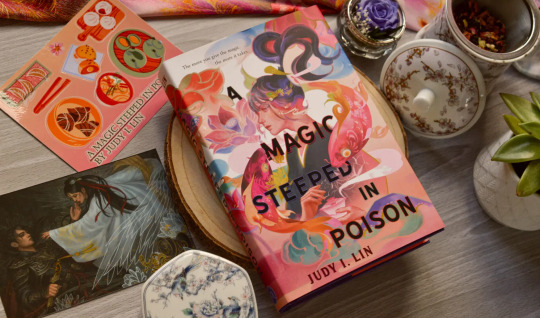
Ugh, I love fantasy stories based on Chinese culture and mythology (see Iron Widow and If You Could See the Sun). This one makes use of the art of tea-brewing, which the protagonist Ning uses to create fantastical illusions and to participate in a competition looking for the new palace tea master, hoping to save her sister’s life by winning. The writing was great, and I really liked Ning, the protagonist. But to quote from my little book diary: “I’m rooting for the straights with the tea-induced magical connection, but I might be rooting a lot more for the princess-and-her-ferocious-handmaiden side couple.”
10. XOXO by Axie Oh
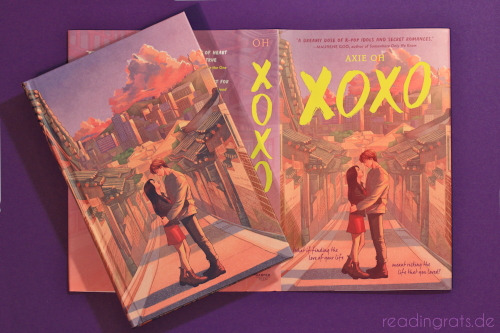
Okay, the last one, which I never expected to be good or original at all, and it’s a bit cliché even for me. But something about the story stuck with me, and so it made this list. It’s a bit of a typical k-pop (which is a genre I don’t even listen to) idol romance, in which Jenny, a cello player, spends an evening with (unbenownst to her) k-pop star Jaewoo in LA, only to reunite with him at a music conservatory in Seoul a few months later when Jenny moves to Korea. I guess you can sort of figure out the plot from there, but the characters are written very well (I think you can see the pattern here), and it’s a really nice read when you want something simple and sweet.
#books#ya literature#ya lit#the inexplicable logic of my life#benjamin alire sáenz#if you could see the sun#ann liang#imogen obviously#becky albertalli#el fabuloso mundo de las letras#jordi sierra i fabra#iron widow#xiran jay zhao#when we were infinite#i kissed shara wheeler#casey mcquiston#a magic steeped in poison
1 note
·
View note
Text
"Leer me salvó la vida..." - Jordi Sierra i Fabra.
0 notes
Text
At 40, Franz Kafka (1883-1924), who never married and had no children, walked through the park in Berlin when he met a girl who was crying because she had lost her favourite doll. She and Kafka searched for the doll unsuccessfully.
Kafka told her to meet him there the next day and they would come back to look for her.
The next day, when they had not yet found the doll, Kafka gave the girl a letter "written" by the doll saying "please don't cry. I took a trip to see the world. I will write to you about my adventures."
Thus began a story which continued until the end of Kafka's life.
During their meetings, Kafka read the letters of the doll carefully written with adventures and conversations that the girl found adorable.
Finally, Kafka brought back the doll (he bought one) that had returned to Berlin.
"It doesn't look like my doll at all," said the girl.
Kafka handed her another letter in which the doll wrote: "my travels have changed me." the little girl hugged the new doll and brought her happy home.
A year later Kafka died.
Many years later, the now-adult girl found a letter inside the doll. In the tiny letter signed by Kafka it was written:
"Everything you love will probably be lost, but in the end, love will return in another way."
By Jordi Sierra I Fabra.
Rumi
#reels #reelsinstagram #reelsinsta #Love #FranzKafka #Inspiration #Motivation #fbreels #reelsfb
English Literature
34 notes
·
View notes
Text
A 40 anni Franz Kafka (1883-1924), che non si è mai sposato e non aveva figli, passeggiava per il parco di Berlino quando incontrò una bambina che piangeva perché aveva perso la sua bambola preferita. Lei e Kafka cercarono la bambola senza successo.
Kafka le disse di incontrarlo lì il giorno dopo e loro sarebbero tornati a cercarla.
Il giorno dopo, quando non avevano ancora trovato la bambola, Kafka diede alla bambina una lettera "scritta" dalla bambola che diceva: "per favore non piangere. Ho fatto un viaggio per vedere il mondo. Ti scriverò delle mie avventure."
Così iniziò una storia che proseguì fino alla fine della vita di Kafka.
Durante i loro incontri Kafka leggeva le lettere della bambola accuratamente scritte con avventure e conversazioni che la bambina trovava adorabili.
Infine, Kafka le riportò la bambola (ne comprò una) che era tornata a Berlino.
"Non assomiglia affatto alla mia bambola", disse la bambina.
Kafka le consegnò un'altra lettera in cui la bambola scriveva: "i miei viaggi, mi hanno cambiato". La bambina abbracciò la nuova bambola e la portò tutta felice a casa.
Un anno dopo Kafka morì.
Molti anni dopo, la bambina oramai adulta trovò una letterina dentro la bambola. Nella minuscola lettera firmata da Kafka c‘era scritto:
"Tutto ciò che ami, probabilmente andrà perduto, ma alla fine l'amore tornerà in un altro modo."
Dal libro Kafka e la bambola viaggiatrice, Jordi Sierra I Fabra

16 notes
·
View notes
Text
Un anno prima della sua morte Franz Kafka visse un’esperienza insolita. Passeggiando per il parco Steglitz a Berlino incontrò una bambina che piangeva sconsolata: aveva perduto la sua bambola. Kafka si offrì di aiutarla a cercarla e le diede appuntamento per il giorno seguente nello stesso posto.
Incapace di trovare la bambola scrisse una lettera – da parte della bambola – e la portò con se quando si rincontrarono. “Per favore non piangere, sono partita in viaggio per vedere il mondo, ti riscriverò raccontandoti le mie avventure.. ”, così cominciava la lettera.
Quando lui e la bambina si incontrarono egli le lesse questa lettera attentamente descrittiva di avventure immaginarie della bambola amata. La bimba ne fu consolata e quando i loro incontri arrivarono alla fine Kafka le regalò una bambola. Ella ovviamente era diversa dalla bambola originale, in un biglietto accluso spiegò…“ i miei viaggi mi hanno cambiata”.
Molti anni più avanti la ragazza cresciuta trovò un biglietto nascosto dentro la sua bambola ricevuta in dono. Riassumendolo diceva: “Ogni cosa che tu ami è molto probabile che tu la perderai, però alla fine l’amore muterà in una forma diversa.”
“Kafka e la bambola viaggiatrice” di Sierra Fabra Jordi

8 notes
·
View notes
Text
jerre's books 02
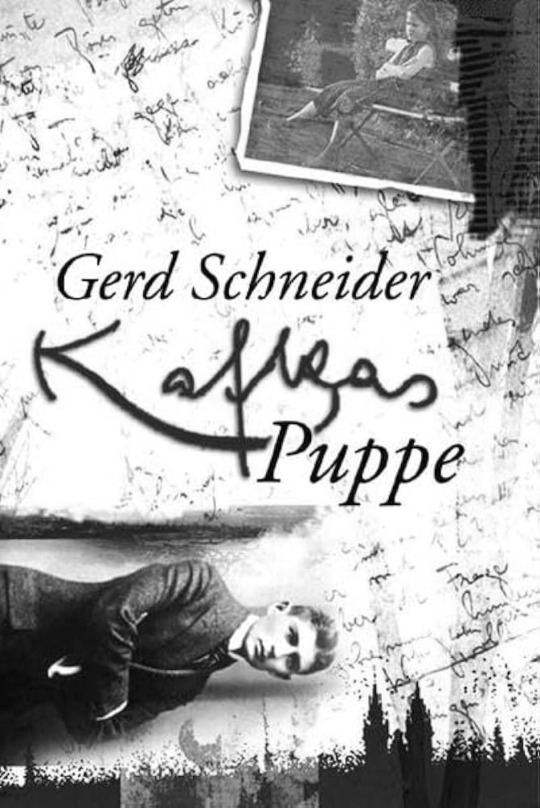
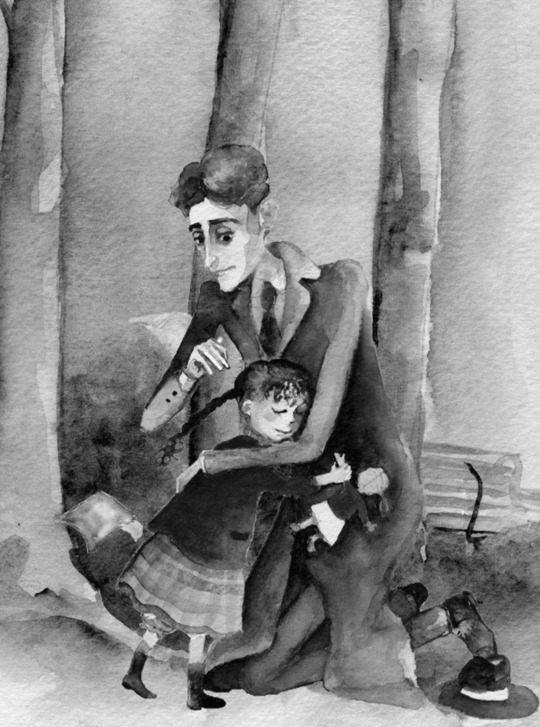
gerd schneider - kafkas puppe [kafka's doll] (2008)
"on an autumn day in 1923, a little girl sits on a bench in a berlin park with tears running down her cheeks. her doll has disappeared, she tells the darkly dressed, gaunt man who has noticed the little girl's quiet crying. and that man is none other than franz kafka, who, in order to comfort the girl, decides to send the doll on a journey.
from now on, the severely ill writer brings her a letter to the park every day, in which the doll tells of her adventures, seeming totally alive. an unusual friendship starts to form, while their difficult lifes, in a similarily difficult time, continue."
𓇢𓆸 background 𓇢𓆸
the author depicts the worrisome circumstances of the weimar republic and the last year of kafka, using his diaries and letters to family as sources, adding fiction where information is missing, especially regarding the girl who lost her doll, that he called "lena" in his novel.
dora dymant, kafka's partner at that time has stated (more about her in this post), that the incident with the little girl and the letters really happened, although neither the girl nor the letters could be found, despite many tries. perhaps there will be more investigation on that case in the future. on the other hand - it all could simply be fiction. more about the obstacles of the story in this german essay.
schneider offered a possible heartbreaking solution to the girl's absence in the end of the book. "the doll's letters" could have been in the pile of documents the gestapo confiscated from dymant's apartment in 1933. she hasn't requested them back after the war and died in 1952.
𓇢𓆸 review 𓇢𓆸
gerd schneider's writing style is light-hearted and takes the reader on a wholesome journey full of fantasy and feelings that range from lightness to eager compassion.
i have rarely encountered a book where the main protagonists were so endearing. the ending is emotionally challenging and leaves the reader thinking back to this story for a long time - whether it's based on real events or pure fiction.
"kafka's doll" is recommended not only to kafka enthusiasts, but also to those who enjoy beautiful language or simply a gripping story.
illustration credits: "kafka and the traveling doll" by jordi sierra i fabra (2006)
#jerre's books#franz kafka#kafka#dora dymant#dora diamant#kafka doll#german literature#literature#bookblr#book reccs#readblr#buchempfehlung#1920s
10 notes
·
View notes
Text

"A 40 anni Franz Kafka, che non si è mai sposato e non aveva figli, passeggiava per il parco di Berlino quando incontrò una bambina che piangeva perché aveva perso la sua bambola preferita. La bambina e Kafka cercarono la bambola senza successo. Kafka le propose di incontrarsi di nuovo lì il giorno dopo, per tornare a cercarla insieme.
Il giorno seguente, non avendo ancora trovato la bambola, Kafka consegnò alla bambina una lettera "scritta" dalla bambola che diceva: "per favore, non piangere. Ho fatto un viaggio per vedere il mondo. Ti scriverò delle mie avventure."
Così iniziò una storia che proseguì fino alla fine della vita di Kafka. Durante i loro incontri, Kafka leggeva le lettere della bambola accuratamente scritte con avventure e conversazioni che la bambina trovava adorabili.
Alla fine Kafka le riportò la bambola (ne comprò una) che era tornata a Berlino.
“Non assomiglia affatto alla mia bambola", disse la bambina. Kafka le consegnò allora un'altra lettera in cui la bambola scriveva: "i miei viaggi mi hanno cambiato”. La bambina abbracciò la nuova bambola e la portò a casa tutta felice.
Lanno seguente Kafka morì.
Molti anni dopo la bambina, oramai adulta, trovò un messaggio dentro la bambola. Nella breve lettera firmata da Kafka c‘era scritto: "tutto ciò che ami probabilmente andrà perduto, ma alla fine l'amore tornerà in un altro modo."
("Kafka e la bambola viaggiatrice”, di Jordi Sierra I Fabra)
34 notes
·
View notes
Text
UNO (HOLA)
No soy escritor.
Pero escribo.
Porque todos sabemos escribir.
Y si le cuentas lo que te pasa a un papel...
Si eres capaz...
No vas a tener ninguna necesidad de ir a un loquero.
Por ese motivo escribo esto.
Porque puedo.
Lo necesito.
Siento qué me libera.
Eso sí: ya veremos cómo acaba.
Porque empezar ya he empezado
Pero de ahí a saber cómo va a terminar...
Bueno, paso.
También se casa la gente sin saber si acierta o la caga.
¿Veis? Ya llevo hechas quince lineas y, con esta, dieciséis
Y ahí va la diecisiete.
La dieciocho.
La diecinueve.
La veinte.
Uno puede escribir un libro enteró así.
Facil.
Pero no, hay que darle contenido.
Densidad.
Así qué comencemos por el comienzo.
Por el primer día.
LO QUÉ YO PIENSO (DE TODO) - Jordi Sierra I Fabra
Me sentí identificado y se los quería compartir, es de mí escritor favorito y espero lo disfruten tanto cómo yo.
Sad_Boy_World
#tlp#trastorno limite de la personalidad#corazon roto#tristeza#trastornos mentales#soledad#ansiedad#colapso#cronicas de un tlp#pensamientos
4 notes
·
View notes
Text

Un anno prima della sua morte, F. Kafka visse un'esperienza insolita. Passeggiando per il parco Steglitz a Berlino incontrò una bambina, che piangeva sconsolata: aveva perduto la sua bambola. Kafka si offrì di aiutarla a cercarla e le diede appuntamento per il giorno seguente nello stesso posto.
Incapace di trovare la bambola, scrisse una lettera - da parte della bambola - e la portò con sé quando si rincontrarono. "Per favore non piangere, sono partita in viaggio per vedere il mondo, ti riscriverò raccontandoti le mie avventure...", così cominciava la lettera.
Quando lui e la bambina s'incontrarono egli le lesse questa lettera attentamente descrittiva di avventure immaginarie della bambola amata. La bimba ne fu consolata e quando i loro incontri arrivarono alla fine, Kafka le regalò una bambola. Ella ovviamente era diversa dalla bambola originale, in un biglietto accluso spiegò... "i miei viaggi mi hanno cambiata".
Molti anni più avanti la ragazza cresciuta, trovò un biglietto nascosto dentro la sua bambola ricevuta in dono. Riassumendolo diceva: ogni cosa che tu ami è molto probabile che tu la perderai, però alla fine l'amore muterà in una forma diversa.
|| Jordi Sierra i Fabra - “Kafka e la bambola viaggiatrice"
1 note
·
View note
Text
Yo siempre hablo en serio. Soy demasiado viejo para hacer bromas.
Algunos días de mayo y uno de junio
Jordi Sierra i Fabra
0 notes
Text
A veces la vida era como una canción.
Durante tres minutos, perfecta.
Jordi Sierra I Fabra.

0 notes
Text
Las chicas de alambre: Jordi Sierra i Fabra
Las chicas de alambre es una novela juvenil escrita por el premiado periodista, músico y escritor español Jordi Sierra i... http://dlvr.it/T0Py2b
0 notes
Text
Las chicas de alambre: Jordi Sierra i Fabra
Las chicas de alambre es una novela juvenil escrita por el premiado periodista, músico y escritor español Jordi Sierra i... http://dlvr.it/T0Py1L
0 notes
Text
Jordi Sierra i Fabra

Um ano antes de sua morte, Franz Kafka viveu uma experiência singular.
Passeando pelo parque de Steglitz, em Berlim, encontrou uma menina chorando porque havia perdido sua boneca.
Kafka ofereceu ajuda para encontrar a boneca e combinou um encontro com a menina no dia seguinte no mesmo lugar.
Não tendo encontrado a boneca, ele escreveu uma carta como se fosse a boneca e leu para a garotinha quando se encontraram. A carta dizia: "Por favor, não chore por mim, parti numa viagem para ver o mundo".
Durante três semanas, Kafka entregou pontualmente à menina outras cartas , que narravam as peripécias da boneca em todos os cantos do mundo : Londres, Paris, Madagascar ...
Tudo para que a menina esquecesse a grande tristeza!
Esta história foi contada para alguns jornais e inspirou um livro de Jordi Sierra i Fabra (Kafka e a Boneca Viajante) onde o escritor imagina como como teriam sido as conversas e o conteúdo das cartas de Kafka.
No fim, Kafka presenteou a menina com uma outra boneca.
Ela era obviamente diferente da boneca original.
Uma carta anexa explicava: "minhas viagens me transformaram".
Anos depois, a garota encontrou uma carta enfiada numa abertura escondida da querida boneca substituta.
O bilhete dizia:
"Tudo que você ama, você eventualmente perderá, mas, no fim, o amor retornará em uma forma diferente".
0 notes
Text
Love will come back
There is so much beauty in this world. It is one of the greatest joys mankind will ever experience. I came across this summarised version of Kakfka and the Travelling Doll (Author: Jordi Sierra i Fabra) about a year ago, and thought of writing it down in case you never see it anywhere else. At 40 years old, Franz Kafka (1883 – 1924) who never married or had children, was walking in a park in…
View On WordPress
1 note
·
View note